 |

|

|
|
|
An up close and personal interview with U.S. Marine Corps Veteran and Togetherweserved.com Member:
Sgt Tom Isenburg U.S. Marine Corps (1964-1970)
PLEASE DESCRIBE WHO OR WHAT INFLUENCED YOUR DECISION TO JOIN THE MARINE CORPS?
I think growing up in the 1950s was reason enough to join the Marine Corps since we watched war movies on a regular basis with stars like John Wayne in "Sands of Iwo Jima" and Jack Webb in the "DI" and the many others such as "Battle Cry" and "Retreat,  Hell!." Our teachers and neighbors were veterans of WW II and Korea. We played war games in fields behind our homes. Hell!." Our teachers and neighbors were veterans of WW II and Korea. We played war games in fields behind our homes.
However, it was my roommate at college who directly influenced my decision to join the Marine Corps. He was a Marine Reservist, a tank driver, attending college for a degree in Criminology so he could work for the FBI when his enlistment ran out. It was 1963 and President Kennedy was dead. I was frustrated that college life seemed out of touch with what was going on in the real world. Dave would laugh and tell me that if I needed some purpose outside of college and be able to "do something for your country, join the Marine Corps and nobody will question your actions anymore."
WHETHER YOU WERE IN THE SERVICE FOR SEVERAL YEARS OR AS A CAREER, PLEASE DESCRIBE THE DIRECTION OR PATH YOU TOOK.
I didn't know about any opportunities for jobs in the Marine Corps except for Infantry. My recruiter suggested that I might like to do that even though my college work was headed toward a career in aviation. At 6 feet 7 inches, the recruiter thought flying would be  out of the question and frankly was concerned that I might be too tall for the Corps. He put me on a chin-pull regimen to 'soften up' my spine such that I could scrunch down and meet the height limit. I knew I was being 'had' but I was going to be in the Corps regardless of what I had to do. out of the question and frankly was concerned that I might be too tall for the Corps. He put me on a chin-pull regimen to 'soften up' my spine such that I could scrunch down and meet the height limit. I knew I was being 'had' but I was going to be in the Corps regardless of what I had to do.
Boot Camp at Parris Island and ITR at Camp Lejeune convinced me that my service would be as a 0311 Marine.
Over the course of the three years I was in, I was the automatic rifleman, Fire Team Leader; Squad Leader, and sometimes as a Platoon Sergeant. For a few weeks I even carried the platoon and company Radios, but always as an Infantry Marine.
IF YOU PARTICIPATED IN COMBAT, PEACEKEEPING OR HUMANITARIAN OPERATIONS, PLEASE DESCRIBE THOSE WHICH WERE THE MOST SIGNIFICANT TO YOU AND, IF LIFE-CHANGING, IN WHAT WAY.
I was transferred to Camp San Mateo, Camp Pendleton, California and assigned to 2nd Platoon, Echo Company, 2nd Battalion, 1st Marines as it was being formed in January of 1965. We initially trained for insurgency countermeasures with a Spanish language requirement, but in early April shifted to Russian and 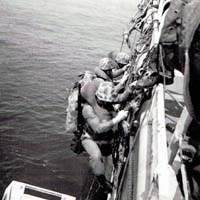 Vietnamese language training with new tactics in beach assaults, rubber boat training and small unit raids and ambushes ----we were designated a "Raid Company." We were trained by WW II and Korea Veterans who made sure we knew the situation, the geography and what tactics to employ based on that geography. Our Platoon Commander (2nd Lt. Doug Pickersgill) and our Platoon Sergeant (Staff Sgt. Jim Little, a Veteran of Korea) trained us to operate at fire team and squad level for long distance patrols. Vietnamese language training with new tactics in beach assaults, rubber boat training and small unit raids and ambushes ----we were designated a "Raid Company." We were trained by WW II and Korea Veterans who made sure we knew the situation, the geography and what tactics to employ based on that geography. Our Platoon Commander (2nd Lt. Doug Pickersgill) and our Platoon Sergeant (Staff Sgt. Jim Little, a Veteran of Korea) trained us to operate at fire team and squad level for long distance patrols.
The LT was a fan of tactics used by Revolutionary and Civil war units that operated throughout the southeastern United States. At first we thought he was operating a little out of our time, but Staff Sgt. Little and some of the other Veterans knew that this type of training would allow fire teams and squads to complete a mission if separated by geography or battle.
The small unit training and the language skills allowed us to know each other and our capabilities in a way that when we went over the side for the "Dagger Thrust" raids along that coast of Vietnam, each one of us knew our job and that of the brother next to us. We were very fortunate. We trained as a unit in the States, the Philippines and Okinawa before combat operations in Vietnam.
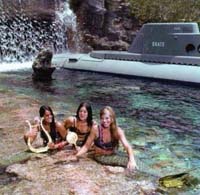 We departed San Diego on August 10, 1965 aboard the USS Bexar. A week before, our fire team went to Disneyland one more time to salute our Flag and to say good bye to our friends who made our times off the base seem like home. Those folks were great and the ladies had to be 18 to work at the Park so we could actually date. They came to Pendleton and joined wives and families the night before our deployment. We would talk about our time with them over and over during our adventure in Vietnam. We departed San Diego on August 10, 1965 aboard the USS Bexar. A week before, our fire team went to Disneyland one more time to salute our Flag and to say good bye to our friends who made our times off the base seem like home. Those folks were great and the ladies had to be 18 to work at the Park so we could actually date. They came to Pendleton and joined wives and families the night before our deployment. We would talk about our time with them over and over during our adventure in Vietnam.
Our first operations were landings made in support of the Dagger Thrust missions-- a series of beach assaults in the fall of 1965. Those landings were right out of any war movie we had seen as kids. I couldn't believe I was doing this for real. We were going over the side from a WW II cargo vessel into Higgins Boats for landings on beach in war time. I don't think I have ever been so high on adrenalin or so proud of the fact that I was part of a force trained to stop the Soviets from taking over another country.
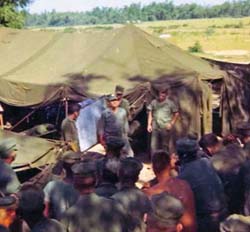 The Dagger Thrust Raids made the local villagers nervous and helped keep the coast highway open during the build up from Chu Lai to Phu Bai, but our first fire fights were not sustained. The VC didn't want to stand and fight. Our company commander, Captain Hammond, employed the tactics we trained for in the States called "hop combat operations." His idea was to play "now you see me, now you don't with Charlie and his North Vietnam pals." In other words, to operate the way or enemy operated--hit and move to a new location and then hit them again as if we were ghosts. The tactic allowed us to surround and eliminate the enemy with as few casualties as possible. The Dagger Thrust Raids made the local villagers nervous and helped keep the coast highway open during the build up from Chu Lai to Phu Bai, but our first fire fights were not sustained. The VC didn't want to stand and fight. Our company commander, Captain Hammond, employed the tactics we trained for in the States called "hop combat operations." His idea was to play "now you see me, now you don't with Charlie and his North Vietnam pals." In other words, to operate the way or enemy operated--hit and move to a new location and then hit them again as if we were ghosts. The tactic allowed us to surround and eliminate the enemy with as few casualties as possible.
Our final landing was into Operation Harvest Moon--a more traditional battle that left many of our Battalion dead and wounded as well as devastating a valley village from B-52 bombing raids. Many of us were transferred to Danang to the new Navy Hospital near the airfield. 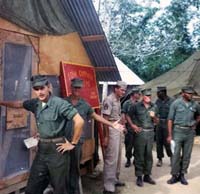 I was scared that I wouldn't be sent back to my unit but just after Christmas, one of our guys got us discharged and found flight passage to Phu Bai, the reported new home of 2/1. We found the unit moving into fixed locations. Some of our NCOs were transferred to other companies and battalions who lost many leaders during the Harvest Moon operation. Staff Sergeants became Platoon Commanders and Lance Corporals became squad leaders. I was scared that I wouldn't be sent back to my unit but just after Christmas, one of our guys got us discharged and found flight passage to Phu Bai, the reported new home of 2/1. We found the unit moving into fixed locations. Some of our NCOs were transferred to other companies and battalions who lost many leaders during the Harvest Moon operation. Staff Sergeants became Platoon Commanders and Lance Corporals became squad leaders.
We changed all of our M14s to automatic and added shotguns and .45 Cal side arms to our personal arsenals. Carrying extra ammo, grenades, socks and food was never a problem after Harvest Moon. Platoons were balanced out at about 35 with four squads of 7 to 8 Marines in each squad, a Corpsman and 2 or 3 souls from Weapons Platoon rounding out the unit.
Sniper fire and small skirmishes were the norm during our Phu Bai deployment. Sometimes we would be sent to patrol along the DMZ and in river valleys near the western boarder of Vietnam to stretch our legs 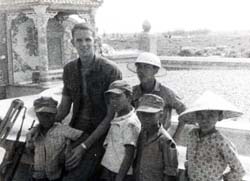 while looking for some action. while looking for some action.
Occasionally we would occupy a village in support of the "pacification program" of winning hearts and minds. We were also introduced to the new rule of engagement: "don't fire unless you are fired upon." which did much to aid and comfort the enemy.
It was a spring of attrition. We would become smaller each time we were assigned to a mission as part of a larger operation. We preferred operating as a small unit which we think was effective but the brass probably thought we were going native. We lost our Lt. Pickersgill to what we thought was a wound and later heard that he had been killed near Danang. Staff Sgt. Little became our Platoon Commander.
By mid-summer we were getting new replacements and taking on Battalion sized missions where we got hurt but gave back in equal measure. Operation Hastings was probably the worst of those missions mainly because we were half our strength and making night helo assaults that made us targets for ground fire. This was our first experience using our own heavy artillery, Puff Gun Ships and Naval gun fire to advance our positions. And this time we faced North Vietnamese regulars with mortars and rockets who knew we were coming. We landed near Cam Lo just south of Hwy 9 and moved along the Suoi Then Hien River (The Ear). Our patrols and NVA patrols would meet on the same trails--and nobody backed down.
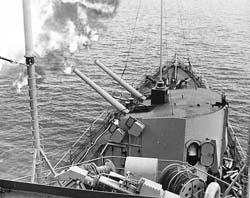 Action was almost constant from July 15 to August 3. I lost my best friend and the last Marine in my original fire team the first night of fighting. A couple of nights later with the platoon split into squad size patrols, we got word that Staff Sgt. Little was wounded but was able to be lifted out of the fight. Action was almost constant from July 15 to August 3. I lost my best friend and the last Marine in my original fire team the first night of fighting. A couple of nights later with the platoon split into squad size patrols, we got word that Staff Sgt. Little was wounded but was able to be lifted out of the fight.
In mid-August 1966 the entire Battalion was packed up and shipped to Danang for refitting. As a unit our strength was less than 25% of its normal TO that was formed at Camp Pendleton some 18 months earlier.
As the unit re-fitted, the 'veterans,' which included our overworked Corpsmen, were transferred to nearby villages to provide cover for Army medics giving 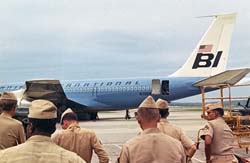 medical aid to the locals. We were excluded from the buildup of the battalion. New officers and NCOs arrived and took over our Platoon with Marines and Corpsman who just got in from the States. We thought we could be useful but leadership thought it would be best if the 'short timers' were assigned other duties. It was a sad time for us even when we boarded a nice United Airlines flight in October bound for Okinawa and the United States. medical aid to the locals. We were excluded from the buildup of the battalion. New officers and NCOs arrived and took over our Platoon with Marines and Corpsman who just got in from the States. We thought we could be useful but leadership thought it would be best if the 'short timers' were assigned other duties. It was a sad time for us even when we boarded a nice United Airlines flight in October bound for Okinawa and the United States.
Arriving at El Toro, California we were advised to change out of our uniforms when in public places. Apparently between Senator Goldwater and Doctor Spock, we military had been killing babies and peaceful villagers. I guess we should have been accused to shooting a couple of Soviet soldiers too. We of course chose not to take the advice of the receiving Sergeant.
I delayed going home for a week to catch back with the friends we made in the spring of 1965 which included the folks who worked at Disneyland and accepted us for just us. It was a happy and sad duty, but somehow helped me to transition from combat to stateside. I honored my three friends and Brothers by giving a salute to our Flag during morning ceremonies at Disneyland as the four of us had done some 14 months before.
I was given at 30 day "survivor leave" at home. My family wasn't too sure what to do with me other than a lot of hugs, family trips and reading through all the letters we sent each other over the 20 months I was away from them. I had a chance to catch up with a family friend just back from college where she was studying to be a Nurse. Her letters to me during my time in country were very funny. She always made me feel special and happy but needing some supervision. Linda agreed to be my wife and we married in 1968. She still makes me happy and her supervision continues to be great.
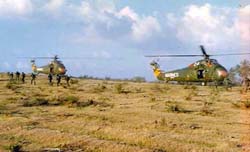 In November 1966 I was transferred to Hotel Company, 2nd Battalion, 8th Marines scheduled to deploy from Camp Lejeune to the Caribbean. Actually, my orders sent me to Lejeune where a very smart Gunnery Sergeant felt that a sea cruise would be good for my health. I think he sensed that I would not be happy being in the rear with the gear. Woody, who served with me in 2/1, was assigned to 6th Marines who were being deployed to the Mediterranean. It seemed to us that we Vietnam Vets couldn't be left in the States for any length of time which was fine with us. In November 1966 I was transferred to Hotel Company, 2nd Battalion, 8th Marines scheduled to deploy from Camp Lejeune to the Caribbean. Actually, my orders sent me to Lejeune where a very smart Gunnery Sergeant felt that a sea cruise would be good for my health. I think he sensed that I would not be happy being in the rear with the gear. Woody, who served with me in 2/1, was assigned to 6th Marines who were being deployed to the Mediterranean. It seemed to us that we Vietnam Vets couldn't be left in the States for any length of time which was fine with us.
Staff Sgt. Wildermuth welcomed me to his platoon in Hotel Company. When I asked what he wanted to me to do as we got ready to deploy he said that I was to help train the Officers and NCOs in combat tactics used in Vietnam. He said this trip to the Caribbean would be used to train Marines and Corpsman for duty in Vietnam 'if needed.' If needed I asked. He said there was a question that the war in Vietnam would be ending soon. I thought I landed on a different planet.
Woody felt the same way. We found that there were only a few Marines who had served in Vietnam being assigned to the 6th and 8th Marines. 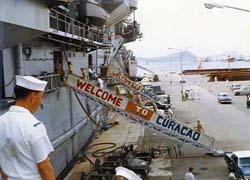 We didn't have anybody to talk to about what we thought or did. We were alone but surrounded by our new brothers asking questions about how to fight and survive in Vietnam combat. Now we understood just how alone those Vietnam replacements must have felt coming into a platoon who had formed and trained for 5 months before going into combat. Woody decided for us that we would ensure that our new brothers would be able to blend in when they arrived in Vietnam. We didn't have anybody to talk to about what we thought or did. We were alone but surrounded by our new brothers asking questions about how to fight and survive in Vietnam combat. Now we understood just how alone those Vietnam replacements must have felt coming into a platoon who had formed and trained for 5 months before going into combat. Woody decided for us that we would ensure that our new brothers would be able to blend in when they arrived in Vietnam.
We boarded the Helicopter Aircraft Carrier, USS Guam, November 6th headed for the Caribbean and training in jungle fighting and survival. I had made Corporal with 2/1 and took over as a fire team leader with the platoon. Thanks to Staff Sgt. Wildermuth, I was able to lead by example without making a complete ass of myself. The Marines and Corpsman were eager to learn and helped me adjust to them.
We set up mock combat scenarios on Veqaus Island that duplicated Operations such as Harvest Moon and Hastings to help our new Marines learn from both our mistakes and successes in Vietnam. The Officers and NCOs were serious about making the Marines ready for combat. I must admit that the geography we selected was a little too real and occasionally I caught myself calling to a buddy who was no longer with us.
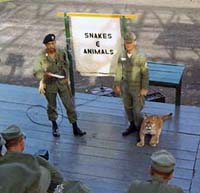 We learned jungle survival from the Green Berets while in Panama as well as rock repelling and river crossing techniques--neither of which we needed in Nam, but the work was fun. I didn't like the beetles we ate but the snake did taste like chicken. The training in Panama introduced the Marines to thick jungles where daylight was filtered and hide outs were hard to find. We learned jungle survival from the Green Berets while in Panama as well as rock repelling and river crossing techniques--neither of which we needed in Nam, but the work was fun. I didn't like the beetles we ate but the snake did taste like chicken. The training in Panama introduced the Marines to thick jungles where daylight was filtered and hide outs were hard to find.
We prepared traps that I had seen in Nam such as the punji traps, swinging grenade and Bouncing Betty--the worst of the lot. Originally the Betty was a Soviet ground mine, but the VC improved on it by stuffing a grenade in a C-ration can with a spring. The device was usually put in a rice paddy or shallow stream and when touched bounced up about a meter before exploding. We learned to find bent branches and trip wires as well as grass covered stake traps but the Bettys were a problem. We accepted the fact that moving through paddies and muddy grass would have to be avoided and while dry trails were dangerous too, the VC would have to work to shoot at you. We couldn't shoot back at the traps.
I had to agree with the Gunnery Sergeant who assigned me to 8th Marines. That 6 month cruise to the Caribbean was good for my health and allowed me to transition away from Nam. The training was easy for me and the Liberty calls were fantastic. We were guests 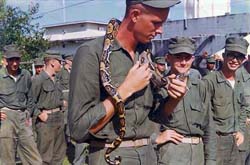 of the Dutch Royal Marines in the Antilles. We Marched in parades and pulled liberty in San Juan, Puerto Rico. We were guests of the British Ambassador to the Virgin Islands. We had a couple of beers at Guantanamo. And we enjoyed the fact that we seemed to be welcomed every place we went. I also felt that I was accomplishing the mission SSgt Wildermuth handed me. I was making my Marines ready for combat in Vietnam. of the Dutch Royal Marines in the Antilles. We Marched in parades and pulled liberty in San Juan, Puerto Rico. We were guests of the British Ambassador to the Virgin Islands. We had a couple of beers at Guantanamo. And we enjoyed the fact that we seemed to be welcomed every place we went. I also felt that I was accomplishing the mission SSgt Wildermuth handed me. I was making my Marines ready for combat in Vietnam.
Some Marines from our unit were transferred Stateside during the cruise which was rumored to be a call up for deployment to Vietnam. I think they were well trained and I hope that all of them made it home from their deployment. For my time with the unit, I was promoted to E-5 Sergeant. I was very proud of being made a Sergeant of Marines. I was honored by the platoon with a snake and a root beer party on the beach at Vieques.
Our return to Lejeune was done in Marine style with a full assault on the beach in front of dignitaries from various NATO countries. We put on good show with much noise and pageantry at least as impressive as any major landing you might see on old newsreels.
I stayed with the platoon through the spring and summer of 1967 conducting training and support to the replacements who joined us almost monthly. I was a squad leader with my own fire teams.
My active duty enlistment was winding down and I needed to make a decision. A year earlier Lt Pickersgill and SSgt Little told me to try out for Officer Candidate School as I would have just enough college credits to be considered. My folks wanted me to finish my education and then decide what I wanted to do with my career as a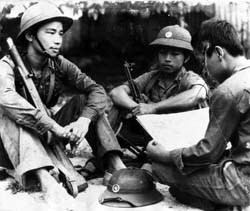 Marine. The re-enlistment officer made up my mind for me. When I asked about attending OCS he told me that there were enough Officers being graduated to cover any contingency over the next year. I argued that based on my experience in Vietnam there were more Corporals leading platoons than Officers but the re-enlistment Officer wasn't convinced. I was discharged from active duty and assigned to a reserve unit near my folk's home. This was 1967. We were seeing the buildup of NVA along the Laotian boarder long before TET of 1968. Marine. The re-enlistment officer made up my mind for me. When I asked about attending OCS he told me that there were enough Officers being graduated to cover any contingency over the next year. I argued that based on my experience in Vietnam there were more Corporals leading platoons than Officers but the re-enlistment Officer wasn't convinced. I was discharged from active duty and assigned to a reserve unit near my folk's home. This was 1967. We were seeing the buildup of NVA along the Laotian boarder long before TET of 1968.
In truth, the re-enlistment officer probably did me a favor. I translated my duty as a Marine to school, civilian jobs and family that continued my pride and willingness to lead in a time when the country was frightened of the military, suspicious of our government and generally hateful about every race in the country. There was more to accomplish at home than in combat which is how I justified not going back to Vietnam.
I had some regrets but over time, my new life took over and my time in Corps became a thing of personal pride, not to be shared but protected. It wasn't until my "dead" Lt. Pickersgill contacted me some 30 years later that my life as a Marine could be shared.
OF ALL YOUR DUTY STATIONS OR ASSIGNMENTS, WHICH ONE DO YOU HAVE FONDEST MEMORIES OF AND WHY? WHICH ONE WAS YOUR LEAST FAVORITE?
 I was an active duty marine for only 3 years. Most of that time was spent on and in the Pacific at Camp Pendleton, Disneyland, Okinawa, Philippines, and Vietnam; with a finish on the Atlantic side with duty at Lejeune, Panama, Dutch Antilles, Puerto Rico and Vieques. They are all great memories to me now. Each location had its good and bad points, but each location was important to me at that time and as such there weren't any "least favorites." I was an active duty marine for only 3 years. Most of that time was spent on and in the Pacific at Camp Pendleton, Disneyland, Okinawa, Philippines, and Vietnam; with a finish on the Atlantic side with duty at Lejeune, Panama, Dutch Antilles, Puerto Rico and Vieques. They are all great memories to me now. Each location had its good and bad points, but each location was important to me at that time and as such there weren't any "least favorites."
However, my longest duty assignment was with the Marines and Corpsman I served with in 2nd Platoon, Echo Company. We were a unit. We came from all corners of the North America to this platoon. We knew each other's capabilities and we stuck together in the very best of our time together and through the worst of times we spent as combat Marines.
FROM YOUR ENTIRE SERVICE, INCLUDING COMBAT, DESCRIBE THE PERSONAL MEMORIES WHICH HAVE IMPACTED YOU MOST?
One memory sticks with me about our adventure in Vietnam. The memory is that the war in Vietnam was a constant contradiction. It was war and it was not war.
On the way back to Phu Bai, 2nd platoon conducted patrols in a number of isolated valleys, including a horseshoe shaped place with a small hill in the center surrounded by a range of mountains. We met with and provided support to a group of U.S. Special Forces soldiers who were surveying the area. We pitched poncho tents and spent a week in an area they called Khe Sanh just down highway 9 from an old French Fort that the Special Forces unit had just vacated as an untenable location.
After a long patrol where we lost five of our own we were put on ready reserve for action north of Phu Bai. Our ready action station was a truck parked near a stage where  we were treated to USO shows from Big Tiny Little and Ann Margret. When Ann Margret sang it was if she was singing to each one of us. The fact that she and her troop traveled to this dangerous location made us her number one fans. It was one of our happy times even with our losses. We smiled at the thought of what our lost brothers would have been doing when Ann sang. we were treated to USO shows from Big Tiny Little and Ann Margret. When Ann Margret sang it was if she was singing to each one of us. The fact that she and her troop traveled to this dangerous location made us her number one fans. It was one of our happy times even with our losses. We smiled at the thought of what our lost brothers would have been doing when Ann sang.
We were given liberty in Hue City. At the time Hue was an "open city"--no combatants allowed thank you. The ancient capital was a combination of Asian and French architecture. Most everyone spoke French and attended Jesuit schools. If you wanted to enjoy yourself you needed to practice your French. The people were friendly and welcomed us to their city. For all we knew we were having a beer with NVA and VC each time we went to town.
We traveled to Hue in 6-bys in civilian clothes and unarmed. Yep. Civilian clothes and unarmed! First squad leader, Woody, and I had our pictures taken riding bike chairs along the river without a care that we didn't have so much as a sharp stick between us. Looking back on what happened to Hue in 1968, I can't help but wonder what happened to those teachers, school children and "friends" who invited us into their city.
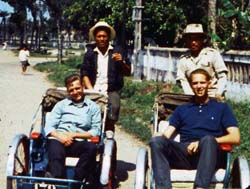 From April to June we became village people. Platoons were broken up into squad size teams that were formed into the newly named I-Corps Combined Action Companies. Our 5 to 8 man 'companies' settled in with local Popular Forces Platoons at various villages north of Hue giving aid and training. Our Doc Byars found himself in a happy space with an almost constant stream of happy, healthy children and adoring mothers to keep him busy. Poor Doc had worked too hard and lost too many. This change was a good thing for him. From April to June we became village people. Platoons were broken up into squad size teams that were formed into the newly named I-Corps Combined Action Companies. Our 5 to 8 man 'companies' settled in with local Popular Forces Platoons at various villages north of Hue giving aid and training. Our Doc Byars found himself in a happy space with an almost constant stream of happy, healthy children and adoring mothers to keep him busy. Poor Doc had worked too hard and lost too many. This change was a good thing for him.
Sadly, one of 'our villages' was being scheduled for demolition as it lay across a main staging trail expected to be used by the NVA to bring in supplies. There was suspicion that the older children of the village were aiding the NVA in moving supplies into the valley, none of which was in evidence while we were with them.
We had spent a few weeks working alongside the villagers to prepare their fields for planting and had the privilege of being invited to a wedding. 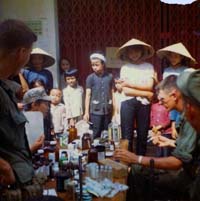 This was a village of 16 families. We didn't think the village was that strategic but you could see Laos from their fields. Our Lt. Pickersgill brought the balance of the platoon with him to implement his great idea to move as much of the village to a safe location as possible. Staff Sgt. Little got support from an Army motor pool to supply the trucks and a few Sailors from a nearby construction battalion helped us pack up the families, their possessions and most of their dead for transport them to a "refugee camp" located 25 kilometers away. This was a village of 16 families. We didn't think the village was that strategic but you could see Laos from their fields. Our Lt. Pickersgill brought the balance of the platoon with him to implement his great idea to move as much of the village to a safe location as possible. Staff Sgt. Little got support from an Army motor pool to supply the trucks and a few Sailors from a nearby construction battalion helped us pack up the families, their possessions and most of their dead for transport them to a "refugee camp" located 25 kilometers away.
The LT told us to imagine that something like this could happen at home in the United States if we lost this war to the Soviets. He said we should always treat non-combatants the way we would want our families to be treated and respected. The villagers were accepting, even appreciative of our help and care. We thought what wonderfully strong people we were helping to defend. This was the worst day and best day of the war for us.
That is what I mean by contradictions. From long patrols and many combat missions to being unarmed in a city of hostiles. Or, being sad about losing good friends while we listen to a singer from the States; or, to saving a reported enemy and their families from certain death. It has made me a better American, a good boss; loving husband and father; and, a witness for the families of the men we lost because I had the honor to serve with Marines living a life of contradictions.
WHAT ACHIEVEMENT(S) ARE YOU MOST PROUD OF FROM YOUR MILITARY CAREER? IF YOU RECEIVED ANY MEDALS FOR VALOR OR OTHER SIGNIFICANT AWARDS, PLEASE DESCRIBE HOW THESE WERE EARNED.
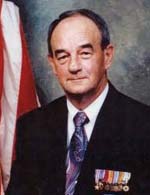 No, I didn't receive any medals although years later Jim Little was angry that a couple of us hadn't gotten the awards we were due after he went through the trouble of writing up the citations on the back of C-Ration box tops. We enjoyed suggesting that the juice in his favorite ham and lima beans ration dissolved the recommendations. Jim bought bronze stars and purple hearts for us during a reunion the platoon had 10 years ago. He ordered us to take them and told our wives and children why we were to get them. After all the intervening years we couldn't say no to that guy. We don't display our medals but we have carefully packed them away with the humility the gifts mean to us. No, I didn't receive any medals although years later Jim Little was angry that a couple of us hadn't gotten the awards we were due after he went through the trouble of writing up the citations on the back of C-Ration box tops. We enjoyed suggesting that the juice in his favorite ham and lima beans ration dissolved the recommendations. Jim bought bronze stars and purple hearts for us during a reunion the platoon had 10 years ago. He ordered us to take them and told our wives and children why we were to get them. After all the intervening years we couldn't say no to that guy. We don't display our medals but we have carefully packed them away with the humility the gifts mean to us.
OF ALL THE MEDALS, AWARDS, QUALIFICATION BADGES OR DEVICES YOU RECEIVED, PLEASE DESCRIBE THE ONE(S) MOST MEANINGFUL TO YOU AND WHY?
The medals our former Platoon Sergeant, Jim Little bought for us some 35 years after our service to the Country. They are not official but I will always remember with pride the fact that my Platoon Sergeant thought enough of my service to gift the medals to me.
WHICH INDIVIDUAL(S) FROM YOUR TIME IN THE MILITARY STAND OUT AS HAVING THE MOST POSITIVE IMPACT ON YOU AND WHY?
To start with, my Drill Instructor, Staff Sgt. Guthrie established a goal for me as he swatted my long legs sticking out of the end of my rack that I better be the best Marine I could be because at my oversized height I would stand out like a tree in the desert. My first call sign was "Tree." I think I did and I am doing well, Staff Sgt. thank you for being the first Marine to believe in my potential.
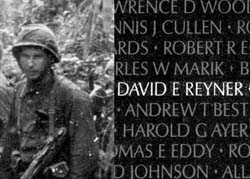 My first platoon commander, Lt. Pickersgill, found some of us back in the mid-1990s we would get together and catch up to find out what each of us had done, since our time in Vietnam. Doug Pickersgill led by knowing his Marines and employing them for the greatest impact during combat. He had a bad habit moving during a fire fight to each position to ensure our field of fire was pointed correctly. Years later he would tell us to adjust to the loss of our brothers by thinking "what would our brother have done with his life had he lived?" Somehow looking forward and not backward at our time in Nam was a healthier approach to our lives. Thank you LT. My first platoon commander, Lt. Pickersgill, found some of us back in the mid-1990s we would get together and catch up to find out what each of us had done, since our time in Vietnam. Doug Pickersgill led by knowing his Marines and employing them for the greatest impact during combat. He had a bad habit moving during a fire fight to each position to ensure our field of fire was pointed correctly. Years later he would tell us to adjust to the loss of our brothers by thinking "what would our brother have done with his life had he lived?" Somehow looking forward and not backward at our time in Nam was a healthier approach to our lives. Thank you LT.
When we hooked up with our former Platoon Sergeant, Staff Sgt. Jim Little, he told us that our commitment to our fallen brother was part of our job to "act as his witness." His words are as real to me today as they were years ago when we found our surviving brothers. He reminded me of what he told me when my fire team leader, David Reynor died so many years ago that: "When you witness the death of your brother, you take on an obligation of honor to live your life better because you are now living his life too."  We found ourselves proud to take on that obligation, except that sometimes it was more brothers than we could honor. Our life became theirs and we think we did okay by them because Jim Little said so. We found ourselves proud to take on that obligation, except that sometimes it was more brothers than we could honor. Our life became theirs and we think we did okay by them because Jim Little said so.
This photo taken in November 2000 photo is me on the left with Jim Little in the middle sitting down and Doug Pickersgill standing on the right.
When both Pickersgill and Little passed away a few years back, we of 2nd Platoon gratefully accepted the responsibility to live our lives better because they taught and led us to be their witness. They taught us Honor, Commitment and Courage in combat and in life after combat. I think their lives are doing well. I am better for them and because of them I am doing well. But living their lives is a lot of work.
CAN YOU RECOUNT A PARTICULAR INCIDENT FROM YOUR SERVICE WHICH MAY OR MAY NOT HAVE BEEN FUNNY AT THE TIME, BUT STILL MAKES YOU LAUGH?
One of our Fire Team leaders, Allen, was a very smart Marine with a love of old stories and plays. He spoke in large words and would use speeches from Shakespeare to get his point across. During operation Hastings, he talked continuously about the British Battle of Hastings  because it was fought a mere 900 years ago. He was sure we were the Norman conquerors. We had no clue what he was talking about most of the time but he made us think and laugh at the same time. He was also a tunnel rat that could crawl into a cave and make barking noises like a dog to invite Charlie to come out of his hole. Allen was a very brave guy. because it was fought a mere 900 years ago. He was sure we were the Norman conquerors. We had no clue what he was talking about most of the time but he made us think and laugh at the same time. He was also a tunnel rat that could crawl into a cave and make barking noises like a dog to invite Charlie to come out of his hole. Allen was a very brave guy.
During a nasty fire fight we had to vacate a hill that had caught fire from a rocket attack. As we moved into the jungle we saw the VC coming at us in large numbers. When they attacked, we heard this high pitched scream saying "Great Goobly Woobly Momma. Them people is gonna shoot your sweet boy!" Everything stopped. After the initial shock we started to laugh that "little dog" (Allen's call sign) had lost his words. Apparently we scared the hell out of Charlie and they retreated from us. When something at work gets me down, or the news of the day makes me angry all I have to do is say the words, "Goobly Woobly" and I feel better immediately.
WHAT PROFESSION DID YOU FOLLOW AFTER YOUR MILITARY SERVICE AND WHAT ARE YOU DOING NOW? IF YOU ARE CURRENTLY SERVING, WHAT IS YOUR PRESENT OCCUPATIONAL SPECIALTY?
I went back to college on the GI Bill to finish my engineering degrees which led to a 40 year career in military electronics and in the development and deployment of Telecom equipment.
My first real job was in 1972 when I joined a company making countermeasures equipment to  protect U.S. war planes still fighting in Vietnam. Most everyone at the company was former Air Force and Navy aviators and mechanics. I was the token Marine. protect U.S. war planes still fighting in Vietnam. Most everyone at the company was former Air Force and Navy aviators and mechanics. I was the token Marine.
Later I joined commercial startups helping to equip the growth in internet and computing which necessitated going back to school a couple of times. I am currently a technical program manager contracting out my time to help firms starting up operations and/or leading key projects for delivery.
I recently closed out a job supporting the initiative to employ active duty service men and women into companies to gain meaningful employment and learn new skills in design, manufacture and support. The "Title 10 Public Private Partnership" program was designed to provide a means for our service personnel to learn a new trade but stay in uniform should we need them to deploy. The beauty of the program was that as we pulled back from our central Asia adventures our troops could learn a trade while in uniform before they entered civilian life. It was a great program with wonderful potential. It was sad to see it cancelled from the FY 13 Federal Budget.
WHAT MILITARY ASSOCIATIONS ARE YOU A MEMBER OF, IF ANY? WHAT SPECIFIC BENEFITS DO YOU DERIVE FROM YOUR MEMBERSHIPS?
I am a member of 2nd Battalion, 1st Marines Vietnam Veterans Association. This association invites Marines and Corpsman who served with the unit during its operations in Vietnam from 1965 to 1972.
The Association was originally formed by corpsmen from the Battalion companies that were helping their brothers through the VA process and to provide a support group to those less fortunate to be able to adapt to life after the Corps. The Association made great strides in helping those Marines and Corpsmen who were being vilified by their countrymen and government upon their return. Most of them had combat wounds or were wounded in spirit.
My late Lt Pickersgill found me in the late 1980s and asked that I join the association and later when we found Staff Sgt. Jim Little (who had converted a 40 year career in the Marine Corps to being a traveling VA rep.) ordered me to lead the Association. Jim and Doug thought it was time to expand the Association to include all those who served the Battalion. To have a place of common experiences and a place to share what we have become as Americans.
We took a photo of a few of us when we got together in 1998 at Camp Pendleton. From left to right is Bob Shea, Doug Pickersgill, Juan Huerta, Jim Little, and the tall one on the end is me.
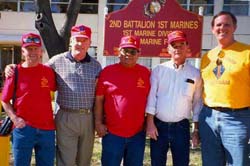 Each year the current board establishes a reunion at locations where we can make it easy for our members to travel and to "talk about what we have done since we were in Country" or "who are we a witness for this time?" Each year the current board establishes a reunion at locations where we can make it easy for our members to travel and to "talk about what we have done since we were in Country" or "who are we a witness for this time?"
We look forward to having our 2015 Reunion near Camp Pendleton to commemorate the 50th year of the deployment of 2/1 to Vietnam. I plan to salute the flag being raised at Disneyland on August 4, 2015 to honor and remember my Fire Team.
IN WHAT WAYS HAS SERVING IN THE MILITARY INFLUENCED THE WAY YOU HAVE APPROACHED YOUR LIFE AND YOUR CAREER?
 I believe that being truthful and standing up for what you believe in the face of adversary is my approach to life and the Marine Corps bred that into me. I get emotional when I see the flag and I can't wait to stand at attention when the Marine Corps Hymn is played. I believe that being truthful and standing up for what you believe in the face of adversary is my approach to life and the Marine Corps bred that into me. I get emotional when I see the flag and I can't wait to stand at attention when the Marine Corps Hymn is played.
I think I can lead, sometimes with a strong hand, but mostly by understanding the strengths and weakness of my team to bring a sense of pride and accomplishment to our work.
And yes I can be strict which my grown children laughingly tell folks is a bark not a bite way of getting them to do things.
Most of all, while I like history, I rarely look backwards. I have to live the lives of 9 Marines and a Corpsman. Between love of my wife and family, I am too busy living the wonderful life of my Brothers.
BASED ON YOUR OWN EXPERIENCES, WHAT ADVICE WOULD YOU GIVE TO THOSE WHO HAVE RECENTLY JOINED THE MARINE CORPS?
 Regardless of your MOS, you could be carrying a rifle into combat and that means keeping yourself and others safe while you carry out your mission. Regardless of your MOS, you could be carrying a rifle into combat and that means keeping yourself and others safe while you carry out your mission.
I congratulate you on your choice of service and frankly I am proud to be a member of a Marine Corps that takes the brightest and best of us and repeatedly sends them into harm's way where they exemplify great heroism and patriotism. Thank you for making my Marine Corps mean something to the world again.
By the same token I wish we had no wars to fight but when we do that you are able to return to family and friends and that your job as a witness is minimized because your brothers have come home with you.
IN WHAT WAYS HAS TOGETHERWESERVED.COM HELPED YOU REMEMBER YOUR MILITARY SERVICE AND THE FRIENDS YOU SERVED WITH.
First, your help to me in finding those I served with in the 2/1 and 2/8. We continue to look for our brothers to answer the question "what they have done since our time and for those we have lost and what would they have done had the lived?"
TWS has provided a means to answer that question. Thank you.
|
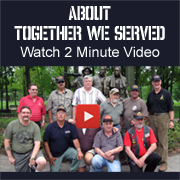


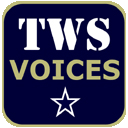
Read Other Interviews in the TWS Voices Archive
| Share this Voices on:


  |
|
TWS VOICES
TWS Voices are the personal stories of men and women who served in the US Military and convey how serving their Country has made a positive impact on their lives. If you would like to participate in a future edition of Voices, or know someone who might be interested, please contact TWS Voices HERE.
This edition of Marines Voices was supported by:
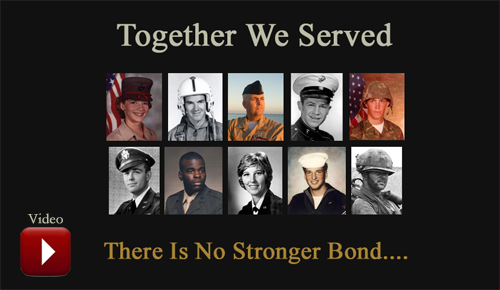
Marines.Togetherweserved.com
Semper Fidelis - Always Faithful. It's more than a motto. It's a way of life. TogetherWeServed.com is a unique, feature-rich resource helping Marines stay faithful to the Brotherhood of the Corps. This is a place where Marines can re-connect with lost Brothers, share memories and tell their Marine story.
To join Marines.Togetherweserved.com, please click HERE.
| |